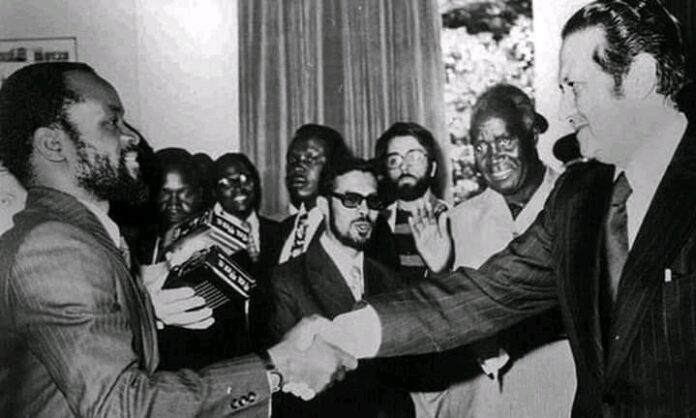LUSAKA ACCORD, PUBLIC HOLIDAY IN MOZAMBIQUE
September 7th 2024, commemorated the 50th anniversary of the signing of the Lusaka Accord also known as Victory Day, a public holiday in Mozambique.
The significance of the Lusaka Accord is that it ended 500 years of Portuguese domination of Mozambique.
The Lusaka Accord was signed by the Frelimo leader Samora Machel and Portuguese government led by the Foreign Minister Mario Soares. It was then read publicly by Joaquim Chissano, Frelimo’s Secretary of Defence and Security.
President Kaunda who presided at the signing ceremony broke down and wept when addressing the two delegations afterward.
As Zambians we are proud that under the leadership of Dr Kenneth Kaunda we facilitated the meeting which led to the end of Mozambique’s struggle for independence.
This is was the right thing to do in the spirit of pan – Africanism.
Accordingly in the annals of history the Lusaka Accord signed between Frelimo and the Portuguese government on September 7th 1974 is forever engraved as the foundation of Mozambique’s independence.
It was a military coup in Portugal in 1974 that precipitated the Lusaka Accord. The military coup also known as the Carnation Revolution got its name from the fact that almost no shots were fired, and carnations were offered to soldiers when the population took to the streets to celebrate the end of the authoritarian Estado Novo government on 25 April 1974 in Lisbon.
Among other factors that led to the end of dictatorship was the pressure the liberation movements in the Portuguese colonies in Africa of Angola, Cape Verde, Guinea-Bissau, Mozambique, and São Tomé and Príncipe had in Portugal.
The coup brought about great changes in the Portuguese government and its relationship with its colonies.
In Zambia because of the coup President Kaunda was approached by some Portuguese business men interested in the changes they saw coming to assure Frelimo and the liberation movements not to think that all Portuguese businesses were against what they were doing.
President Kaunda conveyed this message to the Frelimo President Samora Machel who encouraged him to continue meeting the businessmen.
In Portugal there was a positive wind of change bringing hope to many that freedom fighters in Angola, Mozambique, and the Portuguese territories would meet the new government of Portugal.
The hope was not misplaced as General António de Spínola and the new administration contacted the Vatican to identify African leaders they could speak to regarding their territories in Africa. The Vatican contacted President Julius Nyerere of Tanzania who was a devout Catholic. He recommended that the new administration deal with President Kenneth Kaunda of Zambia.
Consequently, a meeting was organised and a Portuguese delegation led by the Foreign Minister Mario Soares and two Army Majors came to Lusaka.
President Kaunda hosted the Portuguese together with the Frelimo delegation led by Samora Machel in the same part of State House.
Hope was in the air at State House as the Portuguese and Frelimo delegations sought the same thing a solution to the struggle for independence in Mozambique.
President Kaunda fondly remembered the meeting. And I quote at length in his words:
“When the day of their meeting came, we sat together on the table. I was at the top of the table. Samora Machel was on my right. The Portuguese team was on my left.
Here, let me mention that Samora Machel used to have a very active information team led by a beautiful young lady, Graça. I did not know that this was going to be the future first lady of Mozambique.
She was in her own right a freedom fighter. She was a member of the Frelimo Central Committee. I could see how actively Graça gave instructions to cadres as she participated in arrangements.
At the meeting of the Portuguese government and Frelimo at our State House in Lusaka, when I called the meeting to order, I said, to both teams, “ Dear brothers and sisters, Zambia’s task is done. We have been instruments of bringing you here together. We thank God for this. Now, this matter is left in your hands. I beg to leave you to continue with the meeting.”
Samora Machel reacted quickly and said, “We want you to stay there.” And, indeed, the Portuguese delegation seconded that move. They wanted me to chair the Portuguese and Frelimo talks on the freedom of Mozambique. That is how Zambia was given the honour of presiding over that extremely important meeting.
In the end, peace was agreed to by every body present. Arrangements were made for the two teams to continue to finalise all matters concerning issues of independence of our sister Republic of Mozambique. Mozambique’s independence happened in 1975, with Samora Machel becoming first president.”
Zambia’s support did not end as she sent to Mozambique, doctors, nurses, policemen, civil servants to assist the new state.
For Zambia’s role in facilitating Mozambique’s independence, the Government of Mozambique expressed its gratitude in this manner.
Landing at Maputo International Airport you drive to Hero’s square, which takes you to Accord de Lusaka (Lusaka Accord), which takes you into Avenida Joaquim Chissano, which take you into Avenida de Kenneth Kaunda (Kenneth Kaunda Avenue), and which joins into Avenida Julius Nyerere (Julius Nyerere Avenue).
The journey is an honourable tribute to the Lusaka Accord with its vision for the well being of the Mozambican people and a leadership that serves them.
In commemorating the 50th anniversary of the signing of the Lusaka Accord we pray for the fruition of this vision.
* Bishop Musonda Trevor Selwyn Mwamba is President of the United National Independence Party (UNIP) in Zambia
